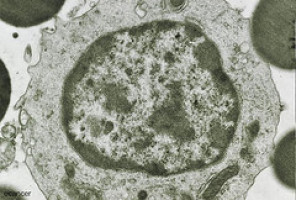
Clinical results published in the Online First edition of New England Journal of Medicine show that the new drug acalabrutinib (ACP-196) promotes high response rates that are durable in patients with chronic lymphocytic leukaemia (CLL) while producing minimal side effects.
ACP-196 is a second-generation Bruton's tyrosine kinase (BTK) inhibitor.
The drug works by permanently binding BTK, which is part of a chain of proteins that relays growth signals from the surface of CLL cells to genes in the cell nucleus enabling cancer cells to survive and grow.
By blocking BTK, the drug halts the flow of these growth signals and the CLL cells die.
Unlike the first generation BTK inhibitor (ibrutinib, marketed as IMBRUVICA), preclinical and phase I/II data reported in this new NEJM suggests that acalabrutinib more selectively blocks the BTK pathway without disrupting other key molecular pathways important for preserving platelet and immune function, thereby avoiding/minimising certain side effects associated with cancer treatment.
The pre-clinical and clinical efforts of this project reported with ACP-196 were led by John C. Byrd, MD, The Ohio State University Comprehensive Cancer Center - Arthur G. James Cancer Hospital and Richard J. Solove Research Institute (OSUCCC - James) hematology division director and D. Warren Brown Chair of Leukemia Research and Amy J. Johnson, PhD, associate professor and OSUCCC - James leukemia researcher. The work of developing ACP-196 was done in close collaboration with investigators at Acerta Pharma, the University of California-Irvine and Cornell Medical Center.
This NEJM study integrates both pre-clinical results supporting the selectivity of ACP-196 and a phase I/II clinical trial where 61 relapsed CLL patients (median age 62) were enrolled and treated at six sites across the United States and United Kingdom.
Other sites have since joined this study based upon the success of the treatment.
The goal of this first-in-human clinical trial was to determine the recommended dose, safety, efficacy, pharmacokinetics and pharmacodynamics of ACP-196 in relapsed CLL.
Researchers report an overall patient response rate (complete and partial) of 95 percent at a median follow-up of 14.3 months.
Of the 61 patients who participated in this first-in-human testing of the agent, 87 percent were able to complete the trial treatment.
No patients experienced Richter's transformation, a rare condition where CLL morphs into an aggressive form of lymphoma, and only one patient's cancer progressed.
"This data is very exciting because it illustrates that acalabrutinib is a highly potent and selective oral BTK inhibitor that can be given safely in patients with relapsed CLL. What is particularly remarkable is how well patients are tolerating this therapy," says Byrd, corresponding author of the study and principal investigator of the phase I/II acalabrutinib trials.
Patients enrolled to the phase I portion of the study received escalating dosages of ACP-196, with a maximum dosage of 400 mg once daily.
Patients involved in the phase II portion of the study were treated with a 100 mg dose of ACP-196 twice daily.
Patient response rates were evaluated through regular clinical assessments, imaging tests and blood work.
"It is nice to see such selectivity of a drug which we demonstrated in our pre-clinical models translate to the clinic for the benefit of patients and predicted improved tolerability" says Bonnie Harrington, DVM, Ohio State University postdoctoral student and co-first author of the study.
In November 2013, the US Food and Drug Administration (FDA) granted accelerated approval of the drug ibrutinib, the first BTK inhibitor drug - for the treatment of mantle cell lymphoma.
In February 2014, the FDA expanded the approval to chronic lymphocytic leukaemia (CLL), primarily based on clinical and preclinical work conducted at the OSUCCC - James.
"BTK inhibitors are transforming CLL from an incurable to a chronic disease, especially considering that standard CLL therapies typically produce a 35-40 percent response rate in this disease setting," adds Byrd.
Clinical trials continue to evaluate ACP-196 in CLL, including a phase 3 head-to-head comparison of ibrutinib and ACP-196 led by Jeffrey Jones, MD, of The OSUCCC - James.